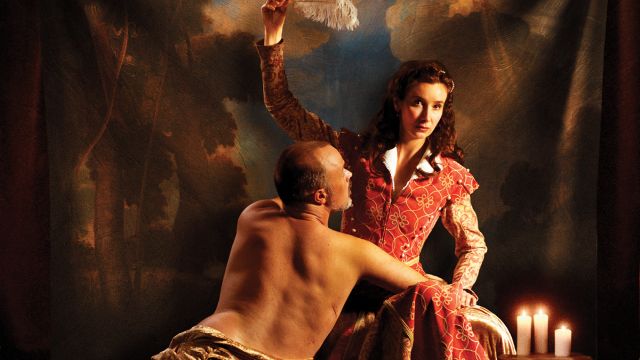Venus & Adonis
A play within a plague…
Depending who you are talking to and what their relationship to the world’s most prolifically staged playwright might be, the authorship of William Shakespeare’s plays is either a non-question or the most burning, infuriating, significant literary mystery of all time. An increasing number of people, including some of the world’s foremost artists and scholars within the form, fall on the side of ‘collaboration’ – that Shakespeare’s company, like a modern film studio, theatre collective or TV show-running team, took their lead from the ingenious scribblings of their famed actor-poet and built the shows from there, sometimes drafting on the floor together while they worked, condensing or expanding ideas, improvising some elements of comedy, and occasionally sending multiple writers home to complete different scenes to meet a deadline. It is possible. If only we knew. Others hold passionately to the beloved image of the candlelit auteur hunched over his Ovid and his Plutarch, (along with flagons of beer) in his garret or the corner of a tavern, pouring his unique soul out on a piece of parchment to present to his stunned fellows the next morning. It’s also possible.
 Advanced, highly analytical and data-based scholarship points nowadays to some strong evidence of genuine collaboration across multiple plays and works, and several key speculations now include a woman in that murky mix of writers. And she is an extraordinary woman. She is the first female poet ever published in the English language, the leading contender for the identity of the Dark Lady of Shakespeare’s Sonnets, and very possibly an inspiration for several women in his plays, and even potentially someone who contributed directly to works such as Pericles, Troilus and Cressida, Taming of the Shrew and Othello. Along with being the potential subject of his two great epic poems, Venus and Adonis and The Rape of Lucrece. But even beyond the monolithic shadow of ‘The Bard’, this Aemilia Lanyer is an extraordinary woman in her own right and someone the 21st Century should be celebrating as a lost voice of reason in a chaotic age.
Advanced, highly analytical and data-based scholarship points nowadays to some strong evidence of genuine collaboration across multiple plays and works, and several key speculations now include a woman in that murky mix of writers. And she is an extraordinary woman. She is the first female poet ever published in the English language, the leading contender for the identity of the Dark Lady of Shakespeare’s Sonnets, and very possibly an inspiration for several women in his plays, and even potentially someone who contributed directly to works such as Pericles, Troilus and Cressida, Taming of the Shrew and Othello. Along with being the potential subject of his two great epic poems, Venus and Adonis and The Rape of Lucrece. But even beyond the monolithic shadow of ‘The Bard’, this Aemilia Lanyer is an extraordinary woman in her own right and someone the 21st Century should be celebrating as a lost voice of reason in a chaotic age.
Lanyer is the centre of Sport for Jove’s new play, Venus and Adonis, by Artistic Director Damien Ryan. The play premiered during COVID as a feature film to huge critical success, and now finally reaches the stage in October 2023 at the Seymour Centre - ‘post-Covid’ - if there is such a thing.
Ryan says, “It’s been an incredible experience working on this story and a strange parallel with its origin – an epic and dazzlingly brilliant poem written by William Shakespeare when the theatres closed down for around 18 months in 1592 and he and his company were out of work. Our more contemporary plague forced the same the sort of pivot and pursuit of ways to keep artists in work and stories being told in 2020/21 and the result is this brand new play, a world premiere for our company. It is a theatrical joy, a beautiful, sprawling, funny, moving story featuring exceptional performances.”
To set the scene…in April 1593, with houses bolted, whole streets cordoned and people fearing each other’s skin, touch and breath, Shakespeare published an epic work about intimacy, heavy breathing and all-too-human touch. That new work took him from common player and jobbing playwright to Europe’s most talked about classical poet. Venus and Adonis, the founding Greek myth of why and how human beings are cursed with love’s agony, was the most acclaimed work by Shakespeare in his own lifetime, outstripping sales of all his plays, even the most revered. It was scandalous, dazzling in its dialogue and deeply erotic, and prompted nuanced speculation about the possible model for the boy Adonis – Southampton himself? – and Venus’ groping, ugly desire as Shakespeare’s own.
He decides to stage this scandalous work at court before the Queen and puts a rival and a revelation in the leading role – Aemilia Lanier. Her own audacious writing, Salve Deus Rex Judaeorum, is a feminist revision of Genesis and an attack on the literary poisons that proved lethal to female freedoms since the earliest days of mythmaking.
Ryan’s new play leaps off from Lanyer’s and Shakespeare’s works and is about the need to speak, the right to love and the power of the printed word. It is about artists and their value.
Venus and Adonis plays at the Reginald Theatre Seymour Centre from September 29 to October 21, 2023. To book: seymourcentre.com or 9061 5344
Subscribe to our E-Newsletter, buy our latest print edition or find a Performing Arts book at Book Nook.

